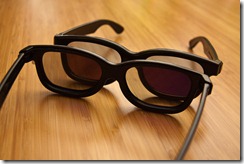Contents tagged with Science
-
Quantum computing and topological qubits explained clearly
Don't let yourself be intimidated by all the quantum jargon. The bases of quantum computing are not that complicated, and I can explain them to anyone who understands programming, classical logic gates, the bare minimum about complex numbers and linear algebra… I'll do so in the light of Microsoft's recent announcement of a new discovery that could bring us much more stable quantum computers.
-
When failure is a feature
 Warning: this post is going to be slightly off-topic and non-technical. Well, not computer science technical at least.
Warning: this post is going to be slightly off-topic and non-technical. Well, not computer science technical at least. -
How to build 2D glasses
 It’s the week-end, which is the perfect time for a slightly off-topic post. It’s still engineering of sorts though in that it provides what I think is an original and cheap solution to a real problem.
It’s the week-end, which is the perfect time for a slightly off-topic post. It’s still engineering of sorts though in that it provides what I think is an original and cheap solution to a real problem. -
Metrics in software and physics
 Every so often, somebody points out how bad of a metric code coverage is. And of course, on its own, it doesn’t tell you much: after all, it’s a single number. How could it possibly reflect all the subtlety (or lack thereof) of your designs and of your testing artillery? Of course, within all the various *DD approaches, some better than others enable you to know whether or not your code conforms to its requirements, but I thought I’d take a moment to reflect on the general idea of a software metric and how it relates to the mothers of all metrics: physical ones, cause you know, I used to be a scientist. Proof: the lab coat on the picture.
Every so often, somebody points out how bad of a metric code coverage is. And of course, on its own, it doesn’t tell you much: after all, it’s a single number. How could it possibly reflect all the subtlety (or lack thereof) of your designs and of your testing artillery? Of course, within all the various *DD approaches, some better than others enable you to know whether or not your code conforms to its requirements, but I thought I’d take a moment to reflect on the general idea of a software metric and how it relates to the mothers of all metrics: physical ones, cause you know, I used to be a scientist. Proof: the lab coat on the picture. -
The symmetrical universe
-
Quantum computing done right
 I know as a good microsoftee I should be supportive of what my employer does no matter what it is, and I might get fired for this post, but Eilon’s latest article is wrong on so many levels I have to step up with whatever integrity I have left and fix this mess.
I know as a good microsoftee I should be supportive of what my employer does no matter what it is, and I might get fired for this post, but Eilon’s latest article is wrong on so many levels I have to step up with whatever integrity I have left and fix this mess. -
Deep thoughts on scientific research
Heard on France Inter the other day about scientific research funding (didn't catch the names of the authors of these quotes though):
-
The duck's wake
This is the first translation I'm doing of one of my French science popularization blog posts.
-
Black hole evaporation paradox?
I just sent this letter to Scientific American. I'd be interested to have any informed opinion on the matter.I’ve read the article about black hole computers with great interest, but there are still a few questions that I think remain unanswered.The article makes it quite clear how black holes could be memory devices with unique properties, but I didn’t quite understand what kind of logical operations they could perform on the data.But another, more fundamental question is bugging me ever since I read the article. From what I remember learning about black holes, if you are an observer outside the black hole, you will see objects falling into the black hole in asymptotically slow motion. The light coming from them will have to overcome a greater and greater gravitational potential as the object approaches the horizon, losing energy along the way and shifting to the red end of the spectrum. From our vantage point, it seems like the object does not reach the horizon in a finite time.From a frame that moves with the object, though, it takes finite time to cross the horizon.This is all very well and consistent so far. Enter black hole evaporation.From our external vantage point, a sufficiently small black hole would evaporate over a finite period of time. So how do we reconcile this with the perception that objects never actually enter the horizon?It seems like what would really happen is that as the horizon would actually become smaller over time, the incoming particles would actually never enter it.If this is true, and no matter ever enters it, would the black hole and the horizon exist at all?From the point of view of an incoming object, wouldn’t the horizon seem to recess exponentially fast and disappear before it is reached?If nothing ever enters the horizon, is it really a surprise that black hole evaporation conserves the amount of information?Does the rate of incoming matter modify the destiny of the black hole? If it grows faster than it evaporates, I suppose the scenario is modified, but how so?I know it is quite naïve to think in these terms and that a real response could only come from actual calculations, but still, I hope that you can give me an answer to what looks like a paradox to me. I don’t see how you can reconcile the perceptions of an external and a free-falling frame of reference if the black hole evaporates except if nothing ever enters the horizon.UPDATE: a recent paper presents a similar theory to solve the information paradox:
